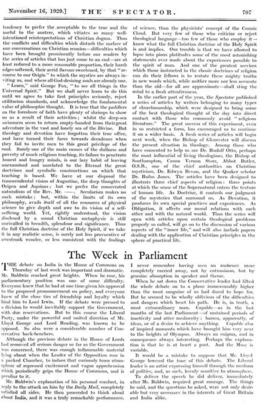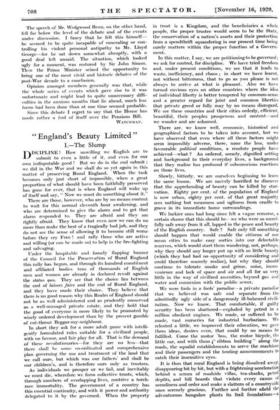The Week in Parliament
THE debate on India in the House of Commons on 1 Thursday of last week was important and dramatic. Mr. Baldwin reached great heights. When he rose, his parliamentary position was one of some difficulty. Everyone knew that he had at one time given his approval to the proposed pronouncement on policy, and everyone knew of the close ties of friendship and loyalty which bind him to Lord Irwin. If the debate were pressed to a division he would inevitably support the Government, with due reservations. But to this course the Liberal Party, under the powerful and united direction of Mr. Lloyd George and Lord Reading, was known to be opposed. So also were a considerable number of Con- servative back-benchers.
Although the previous debate in the House of Lords had removed all serious danger so far as the Government was concerned, there was enough inflammable material lying about when the Leader of the Opposition rose in a packed Chamber, to induce that curiously tense atmo- sphere of repressed excitement and vague apprehension which periodically grips the House of Commons, and is peculiar to it.
Mr. Baldwin's explanation of his personal conduct, in reply to the attack on him by the Daily Mail, completely satisfied all sides. He then proceeded to think aloud about India, and it was a truly remarkable performance. I never remember having seen an audience more completely carried away, not by enthusiasm, but by genuine absorption in speaker and theme.
When he sat down the Conservative leader had lifted the whole debate on to a plane immeasurably higher than the most sanguine of us had dared to hope for. But he seemed to be wholly oblivious of the difficulties and dangers which beset his path. He is, in truth, a most extraordinary man. Capable—as in the last months of the last Parliament—of sustained - periods of inactivity and utter mediocrity : barren, apparently, of ideas, or of a desire to achieve anything. Capable also of inspired moments which have brought him very near to the heights of Olympus. Always an enigma, and in consequence always interesting. Perhaps the explana- tion is that he is at heart a poet. And the Muse is variable.
It would be a mistake to suppose that Mr. Lloyd George lowered the tone of this debate. The Liberal leader is an artist expressing himself through the medium of politics, and, as such, keenly sensitive to atmosphere.
To deliver the speech he did deliver, immediately after Mr. Baldwin, required great 'courage. The things he said, and the questions he asked, were not only desir- able but very necessary in the interests of Great Britain and India alike. The speech of Mr. Wedgwood Bean, on the other hand, fell far below the level of the debate and of the events under discussion. I fancy that he felt this himself— he seemed to be quite incapable of concealing or con- trolling his violent personal antipathy to Mr. Lloyd George—for he sat down somewhat abruptly, with a good deal left unsaid. The situation, which looked ugly for a moment, was restored by Sir John Simon. Then the Prime Minister seized the opportunity to bring one of the most vivid and historic debates of the post-War decade to a conclusion.
Opinion amongst members generally was that, while the whole series of events which gave rise to it was unfortunate and might lead to quite unnecessary diffi- culties in the anxious months that lie ahead, much less harm had been done than at one time seemed probable.
Since this debate I regret to say that the House has made rather a fool of itself over the Pensions Bill.
WATCHMAN.









































 Previous page
Previous page